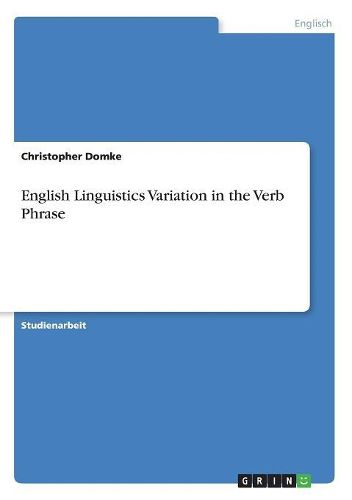Readings Newsletter
Become a Readings Member to make your shopping experience even easier.
Sign in or sign up for free!
You’re not far away from qualifying for FREE standard shipping within Australia
You’ve qualified for FREE standard shipping within Australia
The cart is loading…






Studienarbeit aus dem Jahr 2013 im Fachbereich Anglistik - Linguistik, Note: 1,7, Johannes Gutenberg-Universitaet Mainz (Fachbereich 05 Department of English and Linguistics), Veranstaltung: Variation in the Verb Phrase, Sprache: Deutsch, Abstract: In the following term paper I will briefly outline the development of the Simple Past and the Present Perfect throughout the years and then I will shortly summarize the modern use of these two tenses of both speakers of British and American English. In Present-Day English, references to the past can be expressed either by the Present Perfect or the Simple Past and for each tense there are specific temporal adverbials. Some of them as yesterday, ago and last grammatically call for the Simple Past, while other temporal adverbials such as since and yet require the use of the Present Perfect. Recent corpus-based studies of Present-Day English have shown that the Present Perfect is more often used in British English than in American English.
$9.00 standard shipping within Australia
FREE standard shipping within Australia for orders over $100.00
Express & International shipping calculated at checkout
Studienarbeit aus dem Jahr 2013 im Fachbereich Anglistik - Linguistik, Note: 1,7, Johannes Gutenberg-Universitaet Mainz (Fachbereich 05 Department of English and Linguistics), Veranstaltung: Variation in the Verb Phrase, Sprache: Deutsch, Abstract: In the following term paper I will briefly outline the development of the Simple Past and the Present Perfect throughout the years and then I will shortly summarize the modern use of these two tenses of both speakers of British and American English. In Present-Day English, references to the past can be expressed either by the Present Perfect or the Simple Past and for each tense there are specific temporal adverbials. Some of them as yesterday, ago and last grammatically call for the Simple Past, while other temporal adverbials such as since and yet require the use of the Present Perfect. Recent corpus-based studies of Present-Day English have shown that the Present Perfect is more often used in British English than in American English.